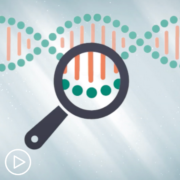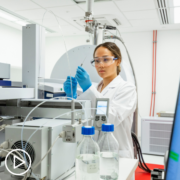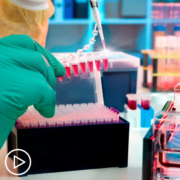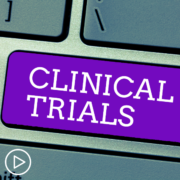Advances in Non-Small Cell Lung Cancer Testing
Advances in Non-Small Cell Lung Cancer Testing from Patient Empowerment Network on Vimeo.
Lung cancer expert Dr. Grace Dy discusses the latest research in lung cancer testing, including liquid biopsies and minimal residual disease (MRD).
Dr. Grace Dy is Chief of Thoracic Oncology and Professor of Oncology in the Department of Medicine at Roswell Park Comprehensive Cancer Center in Buffalo, New York. Learn more about Dr. Grace Dy.
See More From INSIST! Lung Cancer
Related Resources:

An Expert Explains Predictive Biomarker Testing for Lung Cancer |

|

|
Transcript:
Katherine Banwell:
As we know, researchers are still discovering new markers. Could you tell us about the latest news and research in biomarker testing for non-small cell lung cancer?
Dr. Grace Dy:
Oh, there is a lot going on. You know, sky’s the limit. But just an example: we have liquid biopsies that are in clinical use right now, typically in the stage IV setting.
But beyond that, we’re also having what we call minimal residual disease testing in what we call adjuvant situations. For example, patients who had surgery, there’s a big proportion of patients who still relapse.
So, finding out – and our scans are imperfect. They will not be able to detect micro metastatic clones or even a small cluster.
If you have a million cancer cells clustered somewhere, it will not show on the scan.
Katherine Banwell:
Each and every one of them.
Dr. Grace Dy:
Right. So, is there a better way? And so, that’s the question: can we detect it in the blood? So, these are assays that are being developed. Looking at different angles, not necessarily mutations, but maybe what we call epigenetic, meaning changes on top of the DNA that makes the DNA molecule be different in terms of whether some areas of the gene will be expressed or not.
And so, looking at these patterns because they’re different in cancers versus non-cancers. So, whether you can see it in the blood. So, it’s a ripe area.
There’s a lot of – so, there’s some overlap with early cancer detection and MRD, or minimal residual disease testing.
So, I think there’s an intense interest in developing these. But none are fully validated yet. There are trials that are going on, the studies that are ongoing to prove the utility and validity of these tests. So, we’re very excited. And obviously, AI everywhere. You have ChatGPT, right? So, you have AI being incorporated in diagnostics as well, in radiology, in pathology, to see: hey, maybe can we use AI technology to even maybe one day give us a mutation profile, right?
Katherine Banwell:
Yeah.
Dr. Grace Dy:
And that would be huge, right? But we’re not there yet.













